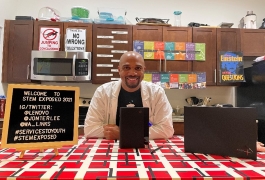How Volunteering Helps You Build Your Résumé
Last updated 1/10/2024
Put down that chemistry text for a minute. Sit back. Relax. Daydream a little bit. You do well in your classes and enjoy them. You are captain of the intramural soccer team and president of the chess club. Okay, maybe you don’t want to brag about being president of the chess club. Soccer team. That’s it.
Now picture yourself sitting across the desk from a hiring manager. She has your résumé and is interrogating you about what’s in it. “Let’s see… President of the chess club. What does this have to do with chemistry?”
I detect your mind may have gone blank, or that you might now be out of your daydream and in a cold sweat. No worries. Those of you who will be graduating this spring may be a little freaked out that you won’t have an answer to such an interview question. inChemistry is here to help you prepare for interviews using your volunteer activities as a springboard to landing your first job.
Volunteer activities are important, and here’s a secret: companies actually care as much about your people skills as your chemistry knowledge, if not more. You can know all of the chemistry in the world, but you won’t get a job if you can’t play nice in the sandbox.
This is where your volunteer activities can work to your advantage. Read on to learn how you can improve your résumé and make a big impact in interviews using skills you’ve already gained through volunteering.
Volunteering is actually work
Well, it is! Volunteering is literally a job. You might not be getting paid for it, and you may have a great time doing it, but it is a real job. So, you’re going to treat your volunteer work on your résumé just as if you were describing a real job that actually brings in a paycheck.
Let’s go back to your role as president of the chess club. Sure, this really has nothing to do with chemistry. But let’s say you were responsible for coordinating a traveling tournament schedule, were supervising the activities of a three-member leadership team comprising a publicity manager, a treasurer, and an event coordinator, and were responsible for coaching your teams on the latest and greatest chess moves. All of these experiences demonstrate leadership skills and management skills, which are relevant to any job.
Here’s another example: You’re in charge of putting together the monthly event programming for your ACS student chapter. Five of your fellow chemistry majors help you. You’re responsible for a department budget, and you have successfully applied for an ACS grant. Here, you not only have leadership and management skills to showcase but also relevancy in supporting chemistry at your school.
How to put it on your résumé
Since we’re treating volunteering as if it were a job that pays, let’s start out with a blank piece of paper. Think about what made you proud in each one of those volunteer experiences. For this example, let’s use chess. You’re going to write down on paper two or three stories of things you did that made you proud. Perhaps you led a successful fundraising event to allow your chess team to travel to different schools. Okay, let’s use this.
In job interviews, you invariably get questions that start with the phrase “Tell me about a time when...”.
One way to make an impression on the interviewer is to use this format:
- The challenge that you faced
- The action that you took to overcome the challenge
- The result of your action
The information in your challenge–action–result response will show a hiring manager how you bring value to a position.
Let’s jump-start this process and do it on your résumé. Write that story on a blank piece of paper using the challenge-action-result format and take as much space as you need.
Now here’s the tricky part: try to condense that story to three or four lines.
Once you’ve written a condensed version, you’ll have a bullet point for your résumé that might read:
Organized a fundraiser to support travel expenses for a chess club of 10 participants. Fundraiser consisted of three pizza parties where food was donated by the university food services department and the venue was donated by the student center. Raised $2000 for travel to the regional chess tournament.
Or, the example of arranging programming for the ACS student chapter could read:
Arranged a schedule of speakers for the ACS student chapter by contacting local professors and graduate students to speak about their experiences in chemistry, and coordinated with our chemistry department to fund the speakers’ travel. Awarded an ACS Salute to Excellence by the local ACS chapter.
Each example, in just a few lines, shows a challenge, an action, and a result. The key is the result. Notice there is something tangible and measurable to the result that shows value. Conveying tangible value in your volunteer work on your résumé demonstrates how it is relevant to the job you’re applying for and will go a long way in putting you ahead of the other candidates applying for the same role.
Let’s get back to that daydream:
“President of the chess club? What does this have to do with chemistry?”
The hiring manager is looking at your résumé. She sees that you have chemistry coursework, research experience at your university, and a summer internship at a local pharmaceutical company. You share how you have reached out to prominent professors and promising grad students to speak at your monthly ACS student chapter meeting, you have persuaded your chemistry department to fund your speakers’ travel, and your chess team is going to the national tournament because you have raised money through your leadership in organizing fun pizza parties.
You go on to tell her how these endeavors have helped your time management skills and, along with what you learned in chemistry class, you have become adept at solving problems independently and creatively. “And did I mention how I coached my intramural soccer team to an in-house university championship?”
The hiring manager looks at you. “Wow. When can you start?”
May your career daydreams come true.




